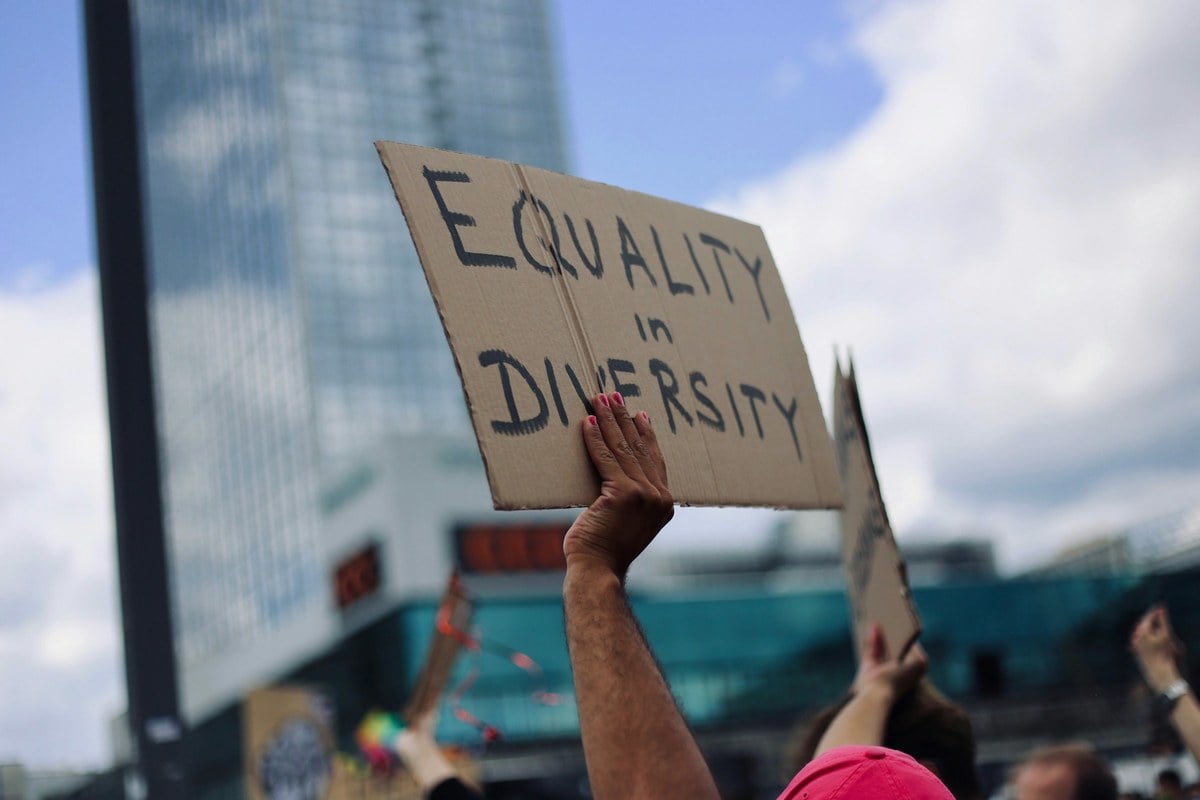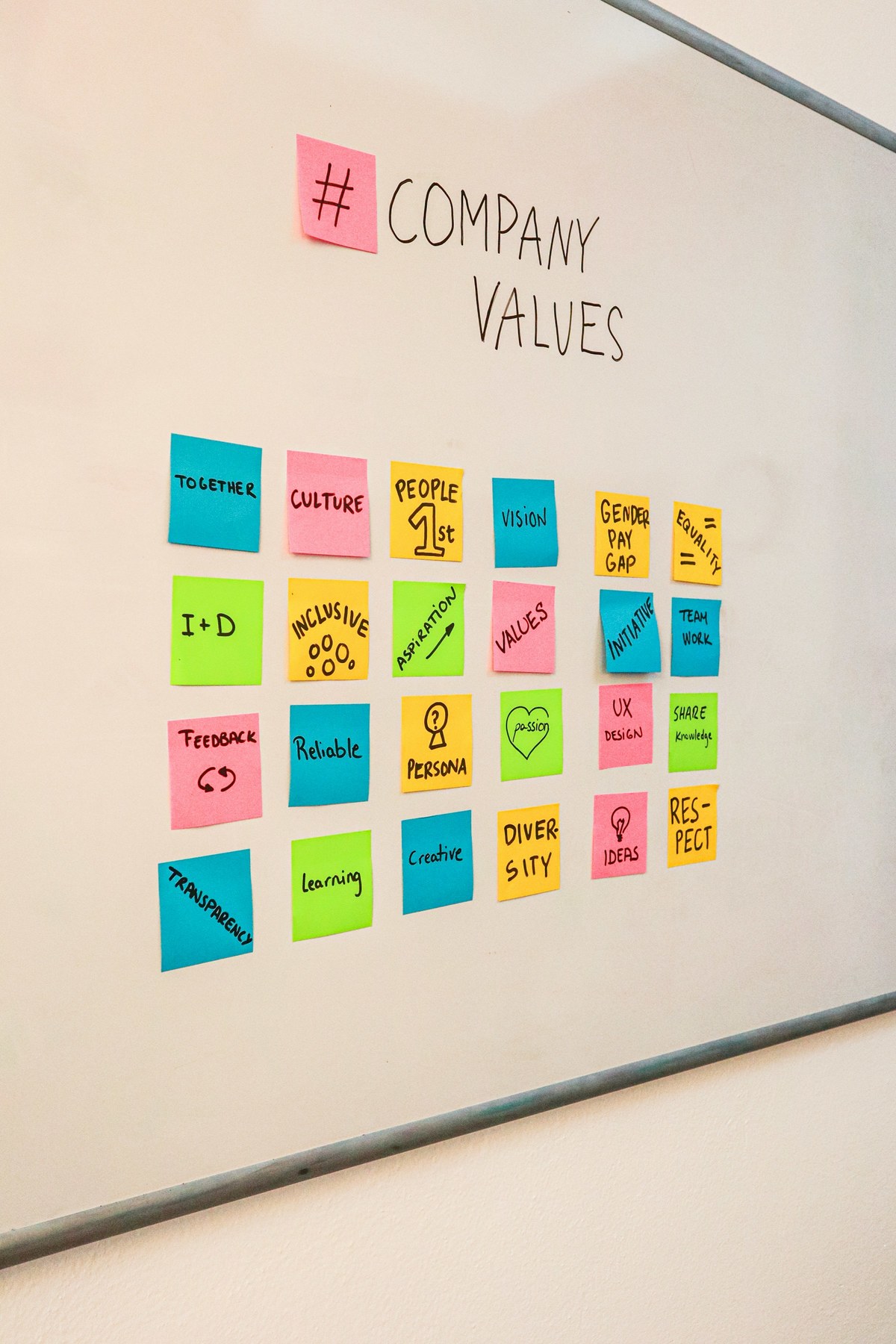Are corporations turning away from inclusion—even in Europe?
Comparing how diversity and equality policies have changed in IT companies across the US, EU, and Belarus.
Comparing how diversity and equality policies have changed in IT companies across the US, EU, and Belarus.

Comparing how diversity and equality policies have changed in IT companies across the US, EU, and Belarus.
With the change of power in the US, there’s been a rapid retreat from diversity and inclusion policies that once seemed like pillars of American business culture. The trend is believed to have accelerated with Trump’s ban on DEI in federal agencies, after which private companies, including Big Tech, began abandoning DEI one after another. However, this trend actually started earlier, and each company’s timeline for moving away from DEI varies. Regardless, Build Remote counted 68 companies that have reduced or closed DEI programs since 2023, including Google, Meta, Amazon, and Microsoft.
But has this new trend reached Europe, and how is it implemented in European offices of multinational corporations? Has everything really changed in American offices? And what about Belarus? We asked leaders of companies with Belarusian roots and employees of Big Tech offices in the EU and US.
An abbreviation for Diversity, Equity, Inclusion.
It’s a set of principles and practices aimed at achieving representation and equality for historically underrepresented and oppressed social groups. DEI ideas took shape in the US in the 1960s as part of the fight against racial and gender discrimination, entered the corporate sector in the 1970s, and gained popularity during economic growth, which required businesses to manage teams consisting of people of different ethnicities, genders, sexual orientations, physical abilities, etc.
In a narrow sense, it’s interpreted as «positive discrimination,» or providing advantages to certain groups, such as hiring quotas. In a broader sense, it involves creating an environment where everyone feels accepted, valued, and have equal opportunities for participation and development.
This winter, shortly after Trump took office, Belarusians working in American corporations reported the elimination of racial quotas in hiring, tightened immigration policies, and removal of words like equity, equality, climate, and justice from documents. However, visible changes at work, according to them, were limited to the disappearance of tampons in men’s restrooms.
Here’s what tech professionals in the US are saying now.
«I can compare what’s happening in a small startup, where DEI is one of the key values, and in a pharmaceutical corporation. Neither company has abandoned DEI, but in both cases, these programs aren’t prominently displayed and don’t affect daily work. Generally, it seems this topic is starting to fade.
Previously, it was used as an election slogan and sold as a simple solution to many problems, as if nearly all of America’s troubles stemmed from DEI. Diversity ideas were presented exclusively as mandatory hiring quotas that forced companies to hire unqualified employees.
But that’s not the case. For example, government organizations were simply required to place job postings in areas where minorities and low-income people live.
In reality, everything is much more complex, although there were indeed excesses, and the large industry of DEI consultants now has much less work.
I don’t participate in the final hiring decisions, I’m only responsible for one interview stage, but I DO NOT see DEI influencing these decisions.
At the same time, I’ve heard people speak out against corporate online DEI courses and similar policies many times because everyone perceives them as meaningless obligations.»
«As far as I know, EPAM didn’t have a DEI department or policy. At least, I haven’t noticed it. And the need for such a department isn’t very clear—perhaps only for obtaining government contracts.
Yes, there are trainings once a year, but I don’t remember them addressing specific categories; rather, they’re ordinary lessons about working in an office with people. The last one was meme-worthy and was probably used in different companies—a piece of it was even posted on YouTube: it featured a very large woman complaining about a handsome man flirting with her in the office. It was very funny.»
Note from devby: As far as we know, EPAM does have a DEI policy, but the company didn’t share details.
An employee at Amazon’s US office also found it difficult to say how the inclusion policy at the company has changed in recent months. According to him, there’s «no news» from the administration. He also suggested that employers are afraid to «stir up the public, as every negative market fluctuation means billions of dollars in losses.»
«When I joined the company four years ago, I went through many trainings, one of which was on DEI. They might have canceled this training altogether by now, and even then it seemed like a box-ticking exercise. It simply explained that all people are different.
For example, this situation: a team of developers, all white guys who have worked together for a long time. A new female Muslim employee joins. On Friday evening, the guys discuss how their football teams played, not involving the newcomer: supposedly she’s quiet and probably doesn’t like football. The task is to explain that a person’s gender and appearance don’t mean they don’t like socializing or don’t like football.
I wasn’t reminded about DEI in the company anymore. And in the hiring training (which all employees complete upon reaching a certain level), there was nothing about DEI.
Every American company has different rules at different times, but the general understanding is that when applying for a job, you need to indicate your race and gender (there can be about a dozen options). And if your CV doesn’t have prestigious companies, a 'certificate competition' might begin: the filtering bot might check your race.
At some point, I stopped indicating my race (there’s an option 'prefer not to answer')—I wouldn’t say recruiters called more often, but it was a call from a recruiter to an application 'without race' that got me my job at Amazon.
Almost everyone I’ve talked to on this topic believes that DEI is a silly idea and that it doesn’t benefit companies. As a result of this policy, white men have become almost the most disadvantaged group. A typical opinion is that basketball teams don’t recruit based on DEI.
Our company, besides development, has many other types of activities, making it easier to address diversity issues. It’s much more difficult for companies with a higher percentage of developers.
Generally, I think the fight for equality and inclusivity in American corporations is hypocritical, as racial segregation happens on its own, with poverty and affluence having their own skin color. The same is true in our company.»
In engineering teams—one type of people, those cleaning tables are others, security guards are a third group. This further intensifies the contrast.
Fun fact: the green card lottery that thousands of Belarusians participate in is called the Diversity Immigrant Visa Program. Essentially, it’s the same DEI but on a country scale.
As a white man, I would likely only benefit from the elimination of DEI. However, as a developer from Belarus, I feel more injustice regarding work visa and relocation rules.»
If I get filtered out due to DEI, it would be disappointing, but I’ll find work. But if it’s due to documentation issues, that would be worse.

The EU (except Hungary and Poland) has implemented DEI reporting requirements for companies through the Corporate Sustainability Reporting Directive (CSRD) and European Sustainability Reporting Standards (ESRS). These measures require companies to measure and report on their diversity and inclusion practices.
Does this mean that American companies in Europe still follow diversity and inclusion policies? It seems so. We have two testimonials, both from Poland. According to one of them, even American Big Tech in Europe must maintain DEI policies, though without racial quotas.
A tech professional working at Google’s Warsaw office says he hasn’t seen any direct instructions to cancel DEI in his company.
«As far as I know, trainings and courses have remained. But mysteriously, restrooms for non-binary persons disappeared. (After a few minutes.) I apologize—my memory failed me. They’re still there.
It’s also worth noting that all text in the offices is duplicated in Braille (and the letters are actually three-dimensional).
I haven’t noticed a reduction in events related to national holidays from different countries either. Once a year or every six months, they conduct mandatory training for everyone, explaining that everyone may have conscious or unconscious prejudices/tendencies to unfairly evaluate people and how to combat this.
So we can say that in Warsaw, nothing has changed regarding DEI.
Regarding hiring, it’s absolutely unacceptable here to indicate belonging to any group. So much so that even in post-interview reports, instead of 'He/She,' we can only use the pronoun 'They/candidate.'»
I’ve never heard of any hiring quotas based on certain characteristics here.
If a candidate with limitations (not necessarily physical) comes to my interview, I can create the necessary conditions for their comfort and objective assessment of skills—I have all the communication channels for this. If I understand that I can’t effectively communicate with a candidate (for example, sign language is needed), I’ll find a suitable interviewer. The candidate’s limitations won’t be either an incentive or an obstacle for their hiring.»
«I’m not sure if we have a DEI policy (specifically with that name), but I can tell you about the real diversity in the company.
Here, you come across employees of various nationalities, and at first, it’s even a bit intimidating because: 1) accents; 2) different cultural backgrounds; 3) different values. For example, a work email at eight in the evening might be seen as disrespectful of personal time. But you get used to it.
As for gender diversity, proportions differ across teams—in some, men are traditionally more numerous due to the domain’s specifics. But among leaders, there are many women, which is great. Additionally, there are openly gay individuals in the company.
In previous companies, I often felt uncomfortable at corporate parties due to men’s attention (and, of course, alcohol). I can feel how much stricter it is in Poland in general and in Opera in particular.
But I don’t know anything about hiring quotas.»

In Belarus, it seems there’s nothing to cancel—the ideology of diversity and inclusion never reached the country. Even advocates of liberal values like Targetprocess didn’t have a DEI policy. Nor does Mikhail Dubakov’s current project, Fibery.
«There wasn’t and isn’t one,» Dubakov briefly replied to the question about DEI. «We don’t think about it at all.»
Andersen company confirmed the absence of DEI to devby, noting that «sometimes it’s wise not to rush with innovations.»
A large service company with Belarusian roots told us they never applied DEI in any of their locations, including the US.
«On the contrary—strict equality for all genders, races, religions, and relatives/acquaintances,» emphasized the leader. «Positions are filled strictly on merit. We’ve implemented meritocracy. The only exception is the Polish office: in accordance with local legislation, we must either hire a person with disabilities or pay the state a certain amount. We haven’t yet found a disabled person who meets our qualifications, so we’ll pay the state.»
Another service company with Belarusian roots responded that DEI doesn’t deserve attention even as a publication topic, so they wouldn’t spend time on it.
An experienced HR professional who has studied DEI confirms that these responses reflect the general picture in Belarus and companies with Belarusian roots.
«I can speak for most companies that the trend of canceling DEI didn’t affect Belarusian companies. Because DEI values and working principles were never implemented there in the first place.»
Is this good or bad? Belarusians don’t seem to mourn the lack of inclusion. At least while preparing this material, we encountered more DEI critics than supporters. However, their feedback suggests that both critics and defenders of equality and diversity principles understand them differently. They criticize educational trainings and hiring quotas while defending theses about tolerance and mutual respect. We’d like to think this is the case.
Рэлацыраваліся? Цяпер вы можаце каментаваць без верыфікацыі акаўнта.
Каментарый скрыты за парушэнне правілаў каментавання.
Правила тут, их всего 5
а зачем ты так про ерат
самое смешное что сегодня ерат намного лучше чем множество других, которые в прошлом кипятком с*ались от упоминания ерата в резюме...)
Какой-то странный, манипулятивный заголовок.
Что значит "отказываются от инклюзивности"? Вот пришел кандидат, на три корпуса обошел всех остальных, а ему говорят - знаете, мы тут отказываемся от инклюзивности, поэтому хотя нам очень выгодно Вас нанять, из-за того что вы слегка темнее белого цвета мы Вас не возьмём?
Наем основанный на справедливой конкуренции навыков и умений никаким образом не является отказом от инклюзивности. Я так понимаю, отказались расистское и сексистское аттрибутирование людей считать метрикой в найме, на инклюзивности это никак не отражается
так не в этом же дело. Если говорят что мы вас не возьмем потому что вы немного темнее чем надо - это называется расизм. А если говорят извините, вы хороший кандидат, но мы вас не возьмем потому у нас уже лимит заполнен белыми гетеросексуальными мужчинами, а вот если бы вы были темнокожим геем - тогда мы бы вас взяли. Это называется DEI
Карыстальнік адрэдагаваў каментарый 20 мая 2025, 18:28
Так от чего отказ произошел, я так не понял. Я так понял произошёл отказ от сексизма (или как иначе назвать приоритет в найме представителям определенного пола) и расизма (или как правильно назвать, когда у представителей определенной ethnicity приоритет в найме). Почему автор статьи называет это "отказ от инклюзивности"? Появились объявления "xxx, yyy, zzz не нанимаем?". Кого-то уволили, только потому что раньше инклюзивили, а теперь перестали?
Нет. Скажут Вы немного светлее чем надо 🤭 и так было до того как Донни развел небо руками.
Это в СССР декларировался интернационализм, а DEI способ cоциальной стигматизации по расу, полу, ориентации.
Карыстальнік адрэдагаваў каментарый 20 мая 2025, 18:54
Я бы гэта называў адмовай ад "інвазіўнасці", бо наймаць трэба каго хочаш, а не каго прымусілі
DEI = Diversity Enforced Invasively
Знакомый работает в канадской НКО в ит департаменте. Пару лет назад рассказывал как у них по DEI нанимали админа. Решили, что должна быть тётка. Искали, в итоге нарисовались две кандидатки: одна негритянка, очень компетентная, и белая, но никакая. Казалось бы, выбор очевиден, но чёрная внезапно оказалась консерватором (проверили по соцсеткам) и поддерживала конвой, а для DEI это харам. В итоге как-то прошло мимо меня, кого же всё-таки взяли. [Часть комментария скрыта за нарушение правил общения. Вот они, их всего пять: https://devby.io/news/comments-2024]
Карыстальнік адрэдагаваў каментарый 20 мая 2025, 20:30
DEI - еще одна ложка в бочку лицемерия.
*
При отклике на, субъективно, 80% вакансий кандидату будет предложено заполнить опросник, в котором идентифицируются пол, национальность, наличие так называемых disabilities, статуча ветерана и даже отнесение кандидатом себя к мексиканской или не мексиканской национальности отдельным вопросом. Компании заявляют, что делается все лишь для статистики, т.е. результаты не влияют на найм. Более того, сам опросник называется Voluntary self identification, т.е. его, как будто, можно пропустить.
*
На практике:
1* пропустить можно приблизительно в половине случаев, т.е. откликнуться на вакансию можно, если только заполнишь опросник - без вариантов для каждого второг случая. Да, среди вариантов ответа на каждый из вопросов есть "Отказываюсь отвечать", но кажется очевидным вывод, который сделают на той стороне "провода", особенно при ответе на вопрос про disabilities, например.
2* В чем проблема собирать статистику среди уже набранных сотрудников, т.е. постфактум ?! Ни в чем.
*
Таким образом, открыты ворота для дискриминации уже во время найма, хотя единственным критерием должна быть профпригодность, способность приносить результат в оговоренные время, качество и бюджет + не быть "токсичным".
Обв лагеря - что республиканцы, что "демократы" - дискредетировали себя уже давно.
Карыстальнік адрэдагаваў каментарый 21 мая 2025, 07:35
Нашему народонаселению чужды все эти инклюзивные практики с диверсити политиками.
наш президент сам определяет кто у него в штабе еврей